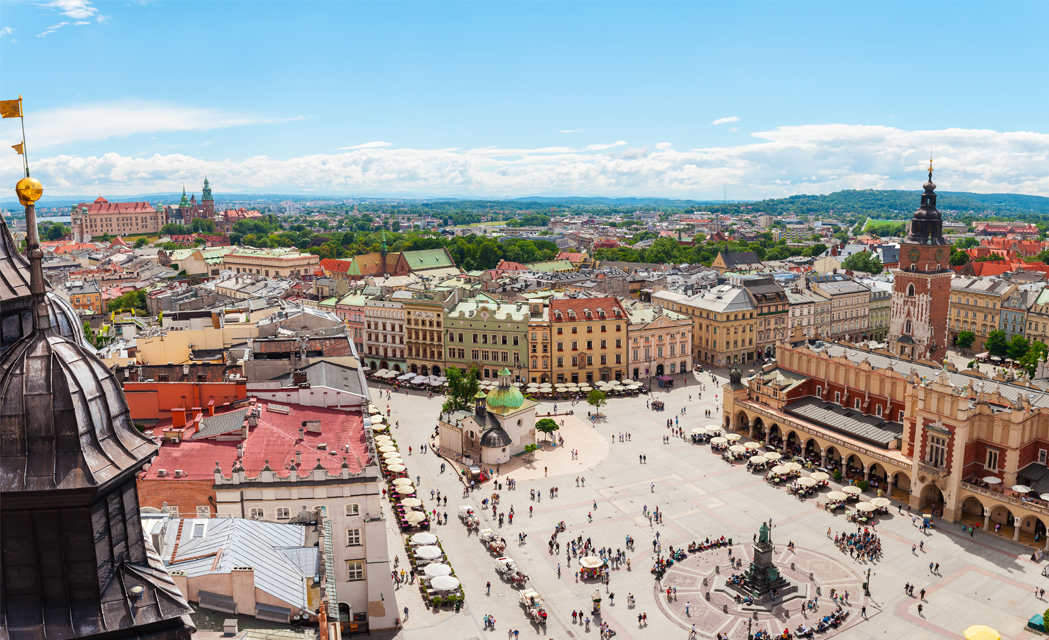Author: Barbara Jarkiewicz
Krakow, alongside several other prominent Polish cities, is dedicated to achieving climate neutrality through the EU’s Mission of “100 Climate-Neutral and Smart Cities by 2030”, with support from NetZeroCities. Within the framework of the EU’s Cities Mission, these urban centres are diligently crafting their unique Climate City Contracts, which will serve as comprehensive blueprints for their individualised climate strategies. Warsaw, Rzeszów, Łódź, Wrocław and Krakow are also taking part in the NetZeroCitiesPilot CitiesProgramme. The cities have joined forces under the NEEST project to develop their Pilot Activity – a practical retrofit tool to curb emissions from buildings.
The Pilot Cities Programme (PCP), a key component of the NetZeroCities support to cities, is dedicated to assisting European cities in experimenting with and implementing innovative strategies for rapid decarbonisation. It operates by transcending thematic boundaries and functional silos to drive systemic change. The overarching aim is to develop a set of innovative solutions that are not only poised for immediate adoption but also primed for scaling and replication.
Recently, a selected group of cities from 21 European Union and Horizon 2020 Associated countries was chosen to participate in the inaugural phase of the Pilot Cities Programme. These cities are set to receive substantive financial and operational support as they work to devise effective solutions tailored to address their key emissions challenges. The programme’s core principles hinge on a systemic approach and a commitment to fostering radical collaboration. Taking a deep dive on how the Pilot Cities Programme empowers cities to experiment, we have met with Krakow to explore their approach and NEEST project with fellow Polish Cities.
Radical collaboration for the green future
Krakow recognises climate change as a cross-sectoral and cross-departmental challenge that requires a collaborative approach. It is a cross-cutting issue in all areas of city management, requiring the cooperation of many departments, municipal units and municipal companies, as well as (above all) joining forces with representatives of business, academia, building owners, residents, etc.
To tackle the issue head-on, they’ve joined forces with fellow Polish cities in the NEEST project, uniting to combat built environment emissions through the development of a shared digital tool. Krakow firmly believes that close collaboration is the key to accelerating progress on climate solutions such as the NEEST project.
“We applied for the project together with other cities, rather than competing with individual projects, because we value cooperation very much. As a consortium of five cities, we share the good practises, but also the unsuccessful ones, and this requires a high level of trust between the partners. We can talk openly with each other, point out the advantages but also the disadvantages. This means, firstly, that we can look at certain things in other cities and replicate them at home, and secondly, that we can see what has failed in other cities and not try it at home”, – said Grzegorz Grzybczyk, Senior Specialist in the Department of Municipal Economy and Climate.
In addition to working with other Polish cities, to broaden the scope of the project, Krakow decided to involve other types of partners in the development of the digital tool. They teamed up with the National Centre for Research and Development, which is a valuable technical project partner and a driver of innovation. They also use the skills and experience of subcontractors, the Energy Forum, which represents the NGOS sector, and another state organisation, the National Centre for Nuclear Research. The city believes that jointly developed solutions will lead to even better results.
NEEST: accelerating Krakow’s built environment transition
Krakow began its climate journey several years ago, but it’s being part of the EU NetZeroCities that has truly propelled the city to take decisive action to decrease emissions. In addition to a robust portfolio of climate projects, Krakow undertook an emissions inventory, meticulously identifying the primary sources of emissions within the city. This assessment revealed that buildings stand out as a significant emissions source. Consequently, Krakow has chosen to focus its efforts on this domain as part of their Pilot Cities activities known as NEEST. This initiative is geared towards addressing energy-inefficient buildings (mainly residential and service buildings) and districts with the aim of substantially reducing the demand for coal-based electricity and heat.
“We have identified three main areas of emissions: Buildings, Transport and Waste. We have already done a great deal in terms of waste. We have a modern waste management system based on a hierarchy of procedures; we have a very high level of waste processing and on top of that a new waste processing centre is being built. We are equally active in the transport sector. A clean transport zone will be introduced in mid-2024, and we are the first city in Poland to decide to take such a step. The biggest gap we have is when it comes to buildings. And we see a great opportunity to close this gap with the NEEST project,” said Małgorzata Malina, Krakow’s Inspector in the Department of Municipal Economy and Climate.
The NEEST project comprises a comprehensive model of the technological revitalisation of five distinct building types in the form of a digital tool, with the aim of significantly reducing the emission factors within these structures to zero. It is not only about thermal modernization but, above all, about collaboration with residents and changing their thinking, revitalisation of urban spaces and adaptation of the environment to the needs of the residents. Furthermore, the NEEST project encompasses a wide array of measures, including organisational, financial, legislative and social aspects, alongside monitoring systems, evaluation and a strong focus on continuous learning. The project will provide valuable insights for the application of modernisation techniques and innovative technological solutions.
“The tool will work in such a way that, for example, a city that wants to start the process of deep thermal modernisation of buildings will receive a package of ready-to-use solutions developed as part of the project which entails a simulator for the city’s energy system that provides direction for action and typical technical and financial solutions for different types of buildings. The next step is to input data for a specific building and get recommendations on what to do and how to do it. And finally, the regular investment process – building permit, applying for financing, introducing business solutions,” Grzybczyk continues.
Taking an area-based approach to building modification, improving the quality of surrounding areas, and actively involving the community yield additional benefits. These include increased resilience to climate change and energy security, improved accessibility (including for individuals with special needs), enhanced social inclusion and a concerted effort to combat energy poverty. The Polish Pilot Cities will develop a guidebook that will enable other cities with similar building types to test and scale as well as create new models for a larger number of types of buildings based on available NEEST models.
Climate City Contracts: Krakow’s climate strategy
At the same time, Krakow, as other Polish Mission cities, is developing and implementing their Climate City Contract, which will address barriers, identify all the key actions to achieve climate neutrality and the ways and means to implement them. Tackling emissions from buildings, which is the goal of their participation in the PCP, contributes to that Climate City Contract process. Grzegorz Grzybczyk underlines the importance of the Climate City Contract, by calling it Krakow’s main climate strategy.
“As we have embarked on the mission, we will not create a separate climate strategy for Krakow, because our Climate City Contract is de facto such a strategy. It contains our targets and how we intend to achieve them. We state everything by giving concrete numbers, specific emission levels and the way we want to reduce them in certain years. We also outline the specific actions we want to take, some of which we are already taking, as well as the financial aspects, how much funding we have, how much we will allocate and how much we need. It’s a very significant document that will probably define Krakow’s climate action for the coming decades.” says Grzybczyk.
By joining the EU Mission on climate neutral cities, Krakow wants to accelerate its efforts and reduce most emissions by 2030. The city acknowledges the formidable nature of the task at hand, yet firmly believes in the importance of pursuing this ambitious goal. They recognise that every stride towards achieving net-zero emissions is important, and that collective action is the catalyst for meaningful change.





